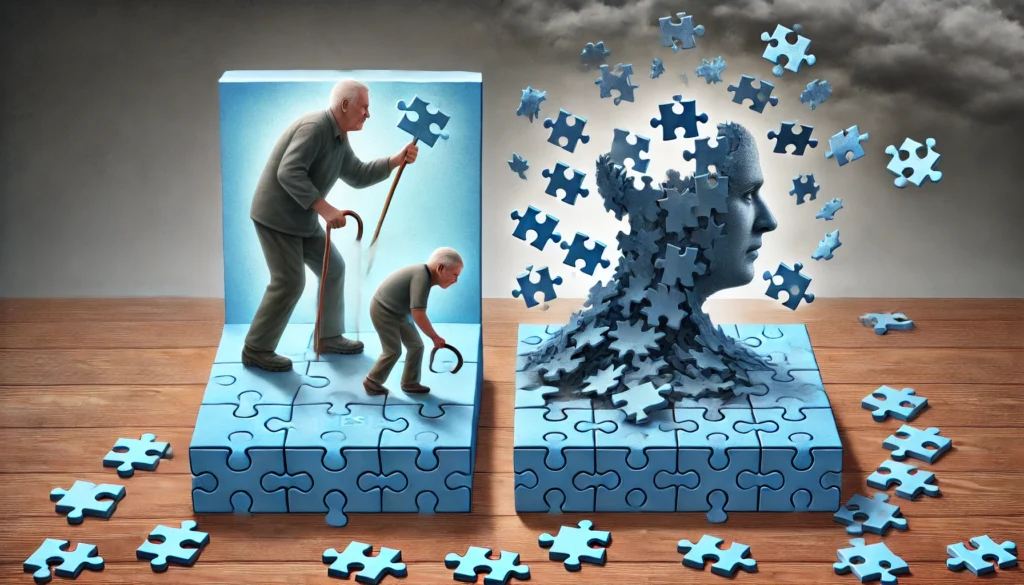In a world where brain health is becoming increasingly important, understanding the nuances between amnesia and dementia is crucial. While these conditions can sometimes overlap, they are distinct in their causes, symptoms, and treatments. This article aims to provide a comprehensive overview of amnesia and dementia, exploring their differences and offering insights into how each affects brain function.
You may also like: Effective Techniques for Short Term Memory Boost
Defining Amnesia and Dementia
Amnesia: A Memory Disruption
Amnesia is primarily characterized by an inability to recall past experiences or information. It can be temporary or permanent, depending on the underlying cause. There are several types of amnesia, including:
Retrograde Amnesia: Loss of Pre-Existing Memories
Retrograde amnesia involves the loss of previously formed memories, which can range from minutes to years. Typically, the most recent memories are affected first, while older memories may remain intact. This form of amnesia can be distressing as it may erase significant life events.
Anterograde Amnesia: Inability to Form New Memories
Anterograde amnesia is the inability to create new memories after the event that caused the amnesia. Individuals might remember their past but struggle to recall new experiences or information. This condition often necessitates adaptation strategies to manage daily life effectively.
Transient Global Amnesia: Sudden, Temporary Episode of Memory Loss
Transient global amnesia (TGA) is characterized by a sudden, temporary episode of memory loss that typically resolves within 24 hours. Although TGA is alarming, it is generally benign and does not recur frequently. The exact cause of TGA remains unclear, but it is often linked to stress or physical exertion.
Amnesia can result from various factors such as brain injury, psychological trauma, or neurological illness. Despite its dramatic presentation, amnesia is more about the disruption of memory pathways rather than a complete loss of memory.
Dementia: A Broader Cognitive Decline
Dementia, on the other hand, is a syndrome encompassing a decline in cognitive functions such as memory, reasoning, and judgment. It is a progressive condition, often associated with aging, and can significantly impair daily functioning. Alzheimer’s disease is the most common form of dementia, but other types include:
Vascular Dementia: Caused by Reduced Blood Flow to the Brain
Vascular dementia results from reduced blood flow to the brain, often due to strokes or other vascular conditions. Symptoms can vary depending on the area of the brain affected and may emerge suddenly or progress over time. Managing cardiovascular health is crucial in preventing or slowing the progression of this type of dementia.
Lewy Body Dementia: Characterized by Abnormal Protein Deposits in the Brain
Lewy body dementia is marked by the presence of abnormal protein deposits, known as Lewy bodies, in the brain. This form of dementia often presents with fluctuating cognitive ability, visual hallucinations, and movement disorders similar to Parkinson’s disease. Early diagnosis can help in managing symptoms more effectively.
Frontotemporal Dementia: Affects the Frontal and Temporal Lobes of the Brain
Frontotemporal dementia primarily affects the frontal and temporal lobes, leading to changes in personality, behavior, and language. It often manifests in younger individuals, between the ages of 40 and 65. Understanding its unique symptoms helps differentiate it from other types of dementia.
The distinction between amnesia and dementia lies in the breadth of cognitive impairment. While amnesia primarily affects memory, dementia encompasses a wide range of cognitive deficits.
Causes and Risk Factors
Amnesia Causes
Amnesia can occur due to various reasons, including:

Head Trauma: Physical Injury to the Brain
Head trauma, often resulting from accidents or sports injuries, can disrupt memory pathways and lead to amnesia. The severity and location of the injury usually determine the extent of memory loss. Protective measures, like wearing helmets, are essential in preventing such injuries.
Stroke: Disruption of Blood Flow to the Brain
A stroke, which interrupts the blood supply to the brain, can damage areas responsible for memory. This disruption can cause both retrograde and anterograde amnesia. Immediate medical intervention is critical to minimize long-term effects.
Infections: Such as Encephalitis or Meningitis
Infections like encephalitis or meningitis can inflame brain tissues, affecting memory and other cognitive functions. Timely diagnosis and treatment are vital to prevent permanent damage. Vaccinations can help reduce the risk of some infections.
Substance Abuse: Alcohol and Drugs Can Affect Memory
Chronic alcohol and drug abuse can impair brain function and lead to memory loss. Substances like alcohol, benzodiazepines, and opioids have been linked to amnesic symptoms. Rehabilitation and support are crucial for recovery and memory improvement.
Psychological Factors: Severe Emotional Distress or Trauma
Psychological trauma can trigger dissociative amnesia, where individuals block out memories associated with the traumatic event. Therapy and counseling play a significant role in helping individuals recover these memories and cope with their emotional impact.
Understanding these causes is essential for effective management and treatment of amnesia.
Dementia Causes
Dementia’s causes are often linked to changes in the brain, including:
Age: Advanced Age Is the Greatest Risk Factor
Age is the most significant risk factor for dementia, with the likelihood increasing as individuals grow older. However, dementia is not a normal part of aging, and lifestyle choices can influence its onset and progression.
Genetics: Family History Can Play a Role
Genetic predisposition can increase the risk of certain types of dementia, such as Alzheimer’s disease. Genetic testing may offer insights into individual risk factors, although environmental factors also play a significant role.
Lifestyle Factors: Diet, Exercise, and Mental Engagement
Healthy lifestyle choices, including a balanced diet, regular physical activity, and mental stimulation, can help reduce the risk of dementia. Engaging in social activities and lifelong learning contributes to maintaining cognitive health.
Chronic Diseases: Such as Diabetes or Cardiovascular Disease
Chronic conditions like diabetes and cardiovascular disease can increase the risk of dementia by affecting blood flow and brain health. Managing these diseases through medication and lifestyle changes is crucial in mitigating their impact on cognitive function.
Research continues to explore the complex interplay of these factors, aiming to find preventive strategies and treatments.
Symptoms and Diagnosis
Amnesia Symptoms
The primary symptom of amnesia is memory loss. However, the pattern of loss can vary:
Difficulty Recalling Past Events: Especially in Retrograde Amnesia
Individuals with retrograde amnesia may struggle to remember events that occurred before the onset of amnesia. This can significantly impact personal identity and relationships, as key life events may be forgotten.

Inability to Form New Memories: Seen in Anterograde Amnesia
Anterograde amnesia affects the ability to remember new information, requiring individuals to use notes, reminders, or digital aids to manage daily activities. This condition can be particularly challenging in dynamic environments.
Confusion and Disorientation: Particularly During Transient Episodes
Episodes of confusion and disorientation are common in transient global amnesia. During these episodes, individuals may repeatedly ask the same questions or appear bewildered. Reassurance and a calm environment can help alleviate anxiety during these episodes.
Diagnosis often involves neurological exams, imaging tests, and assessments of memory function.
Dementia Symptoms
Dementia symptoms are more diverse and progressive:
Memory Loss: Often the Earliest Sign
Memory loss in dementia typically starts with short-term memory, making it difficult to recall recent events or conversations. As the disease progresses, long-term memory may also be affected, impacting daily life.
Difficulty with Communication: Struggling to Find the Right Words
Communication challenges in dementia include difficulty finding the right words or following conversations. These symptoms can lead to frustration and social withdrawal, emphasizing the need for supportive communication strategies.
Impaired Reasoning and Judgment: Poor Decision-Making
Dementia can impair reasoning and judgment, leading to poor decision-making and risky behaviors. Individuals may struggle with tasks requiring planning or complex thinking, affecting their independence and safety.
Changes in Mood and Behavior: Apathy, Depression, or Agitation
Mood and behavioral changes are common in dementia, with individuals experiencing apathy, depression, or agitation. These changes can be distressing for both the individual and their caregivers, requiring patience and understanding.
Diagnosis typically includes cognitive tests, brain scans, and blood tests to rule out other conditions.
Treatment and Management
Amnesia Management
Treatment of amnesia focuses on addressing the underlying cause and supporting memory function:
Therapy: Cognitive Therapy to Enhance Memory Skills
Cognitive therapy can help improve memory skills and develop compensatory strategies. Techniques such as mnemonic devices, visualization, and repetition can aid in memory retention and retrieval.
Medication: In Cases Linked to Neurological Conditions
Medications may be prescribed if amnesia is associated with neurological conditions like epilepsy or brain infections. These medications aim to control symptoms and prevent further cognitive decline.
Lifestyle Modifications: Stress Management and Healthy Living
Lifestyle changes, including stress management, a healthy diet, and regular exercise, can support brain health and memory function. Mindfulness practices and relaxation techniques can also reduce anxiety and improve focus.
While complete recovery may not always be possible, many individuals find ways to adapt and improve their quality of life.
Dementia Management
Managing dementia involves a multidisciplinary approach:
Medications: To Slow Progression and Manage Symptoms
Medications can slow the progression of dementia symptoms and improve quality of life. Cholinesterase inhibitors and memantine are commonly used to manage symptoms in Alzheimer’s disease.
Therapies: Physical, Occupational, and Speech Therapy
Therapies such as physical, occupational, and speech therapy can help maintain function and independence. These therapies focus on improving mobility, daily living skills, and communication abilities.
Supportive Care: Involving Caregivers and Support Groups
Supportive care is essential in managing dementia, involving caregivers, family members, and support groups. Providing education, respite care, and emotional support can ease the caregiving burden and enhance the individual’s well-being.
While there is no cure for dementia, these strategies aim to improve the individual’s quality of life and delay the progression of symptoms.
Future Directions in Research
As our understanding of brain health evolves, so do the approaches to treating amnesia and dementia. Research is increasingly focusing on:
Biomarkers: To Identify Early Signs of Dementia
Biomarkers are being explored to detect early signs of dementia before symptoms appear. Identifying these markers can lead to earlier interventions and potentially slow disease progression.
Neuroprotective Strategies: To Protect Brain Cells
Researchers are investigating neuroprotective strategies aimed at safeguarding brain cells from damage. These strategies include antioxidants, anti-inflammatory agents, and lifestyle interventions that promote brain resilience.
Innovative Therapies: Including Gene Therapy and Regenerative Medicine
Innovative therapies such as gene therapy and regenerative medicine are at the forefront of dementia research. These approaches hold promise for repairing damaged brain tissue and restoring cognitive function.
Future breakthroughs hold promise for more effective treatments and potentially preventive measures.

Conclusion
Understanding the differences between amnesia and dementia is vital for health professionals, caregivers, and individuals alike. While both conditions affect memory, their causes, symptoms, and management are distinct. By fostering awareness and supporting ongoing research, we can improve the lives of those affected and work towards better solutions for brain health challenges.
In the intricate tapestry of brain health, knowledge is power. Whether you’re a health and wellness coach, a science journalist, or a biohacker, recognizing the nuances of amnesia and dementia can enhance your practice, enrich your writing, and empower your journey towards optimal mental and physical health.
Further Reading:
The differences between normal aging and dementia
Memory loss: When to seek help
Important Note: The information contained in this article is for general informational purposes only, and should not be construed as health or medical advice, nor is it intended to diagnose, prevent, treat, or cure any disease or health condition. Before embarking on any diet, fitness regimen, or program of nutritional supplementation, it is advisable to consult your healthcare professional in order to determine its safety and probable efficacy in terms of your individual state of health.
Regarding Nutritional Supplements Or Other Non-Prescription Health Products: If any nutritional supplements or other non-prescription health products are mentioned in the foregoing article, any claims or statements made about them have not been evaluated by the U.S. Food and Drug Administration, and such nutritional supplements or other health products are not intended to diagnose, treat, cure, or prevent any disease.


